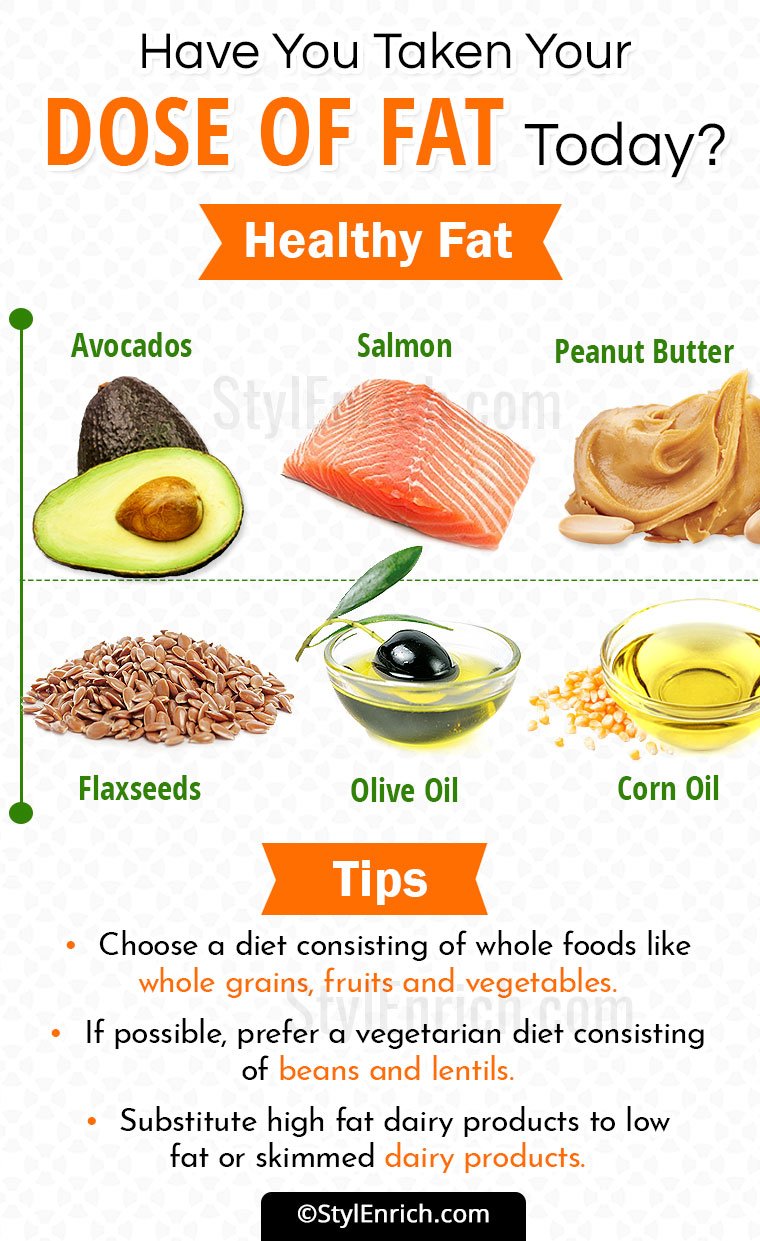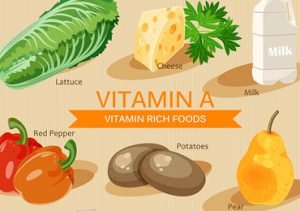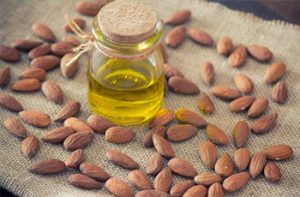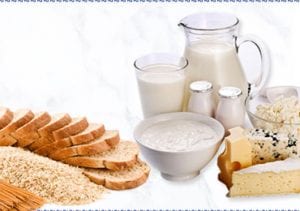- Fats tend to be having a bad reputation of being unhealthy. But if we choose the right type of fat in moderation, it helps in improving our physical and mental health.
- Recommendations have suggested to not go beyond 25 to 30% of the total calories from fat and the saturated fats should not go beyond 10% of the total calories.
- Having a dietary intake consisting of whole grains, fresh fruits, vegetables and pulses with low-fat dairy products and lean meats and using more of natural unhydrogenated vegetable oils like olive oil, canola oil or peanut oil is always preferable.
If being in good health is what you have in your mind and you are planning to make your diet fat free, then you need to rethink your strategy. Considering dietary fats as very harmful to health has been considered as the old school of thought. If we are taking right kind of fat in proper proportion then fats are essential to provide energy, to insulate our body and to produce hormones. Fats also help in absorbing important vitamins and is essential for the functioning of brain and heart. Hence choosing the right kind of fat in the right amount is always a challenge in maintaining health. Too much of fat can lead to obesity. Calories can be converted to fats more easily than carbohydrates and protein. Even bad fats can raise the blood cholesterol and blood pressure, thus increasing the risk towards heart disease, diabetes and some types of cancers. Hence there is a thin line between the types of fats, what to select and how much to consume.
Our dietary recommendation has suggested that about 20 to 30% of total calories come from fat and it should not go less than 10% of the total calories. However, our daily diets have gone overboard with using fat i.e. Using up to 45 to 60% per day. This is because fats make our food palatable and we tend to have a wonderful feeling while eating these foods.
Good Fats Vs Bad FATS
There are two kinds of fat: saturated and unsaturated fats.
Unsaturated Fats
Unsaturated fats or the good fats consists of polyunsaturated and monounsaturated fats. When these fat are eaten in moderation, they help in lowering the cholesterol levels and reduce the risk towards heart disease.
1. Polyunsaturated Fats
Mostly found in vegetable oils which helps to lower the blood cholesterol and triglyceride levels. One of the polyunsaturated fats that are gaining popularity is Omega 3 fats. Omega 3 fatty acids are found in fishes like salmon, mackerel, and catfish and in plant sources like flaxseeds and walnuts. For heart health benefits, it is recommended to have fatty fishes at least twice a week, except the fishes should not be deep fried. Prefer the natural forms of Omega 3 rather than the supplements.
2. Monounsaturated Fats
Mostly rich in oils like olive oils, canola oil or peanut oil. The Mediterranean diets have been brimming with the presence of monounsaturated fats, especially in the form of olive oil, and hence have been beneficial in reducing heart disease. Other food sources that have been rich in Monounsaturated fats are olives, hazelnuts, walnuts, sesame seeds, pumpkin seeds, avocados, cashews and Brazil nuts.
Saturated Fats
The two types of saturated fats that are not good health are Trans fats and Saturated fatty acids. They are preferred to be consumed very sparingly as these fats tend to clog the arteries and enhance the cholesterol levels and thus increase the risk of heart disease.
1. Saturated Fatty Acids
Mostly found in animal foods like poultry skins, meat, high-fat dairy products and eggs and also in vegetable oils like palm oils and coconut oils. The Dietary Guidelines suggest the consumption of Saturated fats should be slashed down to about 7 to 10% of the total calories. Use more of oils of plant origin rather than partially hydrogenated fats or animal fats. Saturated fats tend to have the greater effect of increasing the colon and prostate cancer risk.
2. Trans Fats
Trans fatty acids if used in very sparing amounts in natural form is fine, especially if low-fat dairy or lean meats are preferred. But the notorious one is artificially hydrogenated fats that are achieved when liquid oils are hardened to partially hydrogenated fats. Artificial trans-fat is used in baked goods, cookies, margarine, icing, crackers, frying and microwave popcorns. Trans fats are more dangerous than even the saturated fats. These fats increase the risk of heart disorder by increasing the LDL cholesterol and decreasing the HDL cholesterol. The Dietary Guidelines have recommended reducing the trans-fat consumption to as low as possible.
Fat Recommendations: List Of Healthy Fats And Unhealthy Fats
Foods contain a mixed combination of fats but every fat fall into the category according to the dominant fat the food contains. The below is the list of foods that contain not so good unhealthy fats and unsaturated, healthy fats.
| Unhealthy Fats | Healthy Fats |
| 1. Butter 2. Meat3. Lard 4. Palm oil 5. High fat dairy products 6. Poultry skin 7. Partially hydrogenated fats. |
1. Avocados 2. Salmon 3. Ground flaxseeds 4. Olives5. Olive oil 6. Tuna 7. Tofu 8. Nuts and seeds 9. Sesame oil 10. Canola oil 11. Fish oil 12. Corn oil 13. Peanut butter 14. Cottonseed oil 15. Peanut oil. |
In spite of knowing the composition of fat in our food, we tend to get confused about how to go about with the diet. The following are guidelines of how to reduce the total fat in the diet and how to ensure that the fat we consume is healthy.
- Choose a diet consisting of whole foods like whole grains, fruits, and vegetables.
- If possible, prefer a vegetarian diet consisting of beans and lentils.
- Substitute high-fat dairy products to low fat or skimmed dairy products.
- Salads can be prepared with low fat or light dressing rather than creamy sauces.
- Avoid high-fat sauces consisting of cream and cheese and prefer vinegar, lime juice or mustards.
- Try to be natural and use natural foods. Avoid processed foods like baked goods, desserts and sweets.
- Use fats very sparingly. Incorporate certain cooking methods like baking, broiling or microwaving to reduce the calorie intake.
- If fats need to be used, prefer unsaturated fats like olive oils or canola oils rather than butter or hydrogenated fats.
- Make a habit of reading the label of the food to get the knowledge of the nutrition facts. Look out for foods that are low fat and even the presence of trans fat and saturated fats. Do keep in mind that even if the label says” Trans-fat free”, it does contain about 0.5 gms of trans fat per serving which can add up quickly.
Fats are equally important in our diet just like any other nutrients. We cannot avoid this nutrient or rather it can be dangerous if we go overboard on low fat or no fat diet. But that doesn’t mean we need to consume in higher levels. Moderation is always a key to fats. We do need fats but we don’t need to become fat. If we pick the type of fat consciously, fats will always help to nourish our body instead of harming it.
All fats are not created as equal. Our body requires healthy fats to provide energy and for the brain, cell and tissue development. Essential fatty acids are required for the absorption of Vitamin A, vitamin D, vitamin E, and vitamin K. and for production of hormones. Fats have the positive influence on cognitive and physical performance.
Thus we don’t need to get hyped up with fats present in our foods. But with 9 kcals per gram of fat, you need to have a check on how much and what type of fat are you consuming per day.
Frequently Asked Questions
1. We have heard a lot about the importance of coconut oil in our diet. How beneficial is coconut oil?
Ans. Coconut oil is considered a superfood. It contains saturated fats but still considered to be healthy due to the presence of healthy medium chains fatty acids like lauric acid, caprylic acid, and capric acid. These acids form about 62% of the oils in coconut. These medium chain fatty acids(MCFAs) are easier to digest, are anti-microbial and anti-fungal and cannot be stored as fat. Coconut oils are processed by the liver and can be readily converted to energy rather than being stored as fat. Apart from this coconut oil is a good immune system boost, cures urinary tract infection, prevents heart diseases and high blood pressure and reduces inflammation and arthritis.
2. Flaxseeds have been gaining popularity nowadays. How can I incorporate flaxseeds into my diet?
Ans. Flaxseeds are brimmed with many nutrients. It consists of soluble fiber and Omega 3 fatty acids that can help in lowering the undesirable fats in the blood. They are enriched with lignans, protein, phosphorus, magnesium and other minerals. If flaxseeds are not chewed properly, they can go undigested from the system. Hence ground or milled flaxseeds are preferred. Grind the flaxseeds and add the powder to baked goods, cereals, yogurt, and oatmeal. Sprouted Flaxseeds can enhance the protein and Omega 3 content. Flaxseeds can be added into soups, sprinkled on salads or ground into fresh fruit smoothies. Adding a tablespoon of flaxseed powder will give you a healthy, nutty flavor.
Read more – Easy Tips on How to Lose Lower Belly Fat!


















